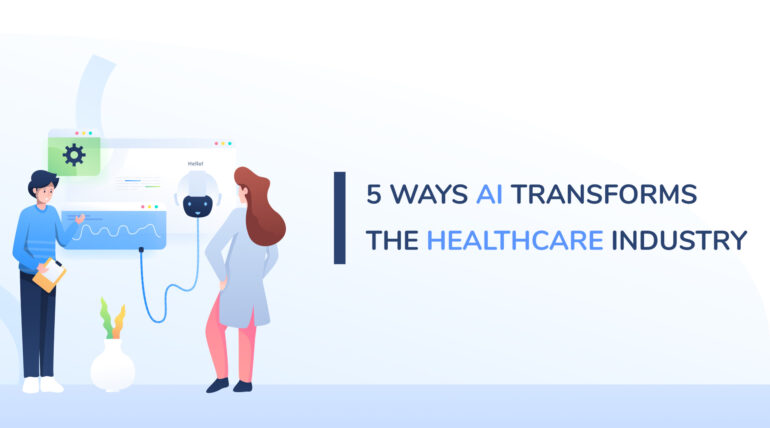
Artificial intelligence refers to the simulation of human intelligence processed by machines, especially computer systems. It is gaining significant momentum in healthcare and is predicted to have the potential to not only significantly transform the industry, but also the way practitioners interact with their patients. AI is transforming many areas of the healthcare industry by redefining healthcare and its core functions. From virtual nurse assistants to robot-assisted surgeries this technology offers improvements in diagnosis, treatment, and overall care.
AI is integrated with a collection of diversified technologies that allow machines to learn, perceive, and act. Here is a compilation of the top 5 AI applications in healthcare:
1. Enhanced human abilities and mental health support:
The usage of AI in radiology and cardiology departments has made it possible to detect severe issues at an early stage. AI-assisted tools can predict, prevent, and diagnose illnesses better and faster. It relies on people’s data to evaluate the previous and existing health condition of patients. By comparing the data the healthcare professional can diagnose the disease more
accurately and can also predict the health issues an individual can encounter in the future. For example, AI-based applications help detect cancer cells at an early stage thereby providing ways to prevent them from growing.
This data can help doctors as well to formulate a cure plan keeping in mind the patient’s medical history and monitor their health conditions. Mistakes occurring because of incomplete medical histories, large caseloads, etc. are prevented due to the huge processing capacity of AI.
2. Robot-assisted surgery:
Integrating robotics with AI is an extremely promising endeavor. AI-assisted robots enable doctors to execute surgeries with flexibility and accuracy that go beyond individual abilities. From open-heart surgeries to minimally invasive procedures, AI’s integration with robotics leads to reduced surgical complications and improved patient recovery time. Also, there exist surgical
bots that use computer vision to implement surgeries after accurately determining the measurements of the human body. While executing complex surgery, AI provides the surgeon with real-time data about the movements that the surgeon makes during the procedure, allowing them to identify the risk and reduce it. To enable the progress and success of microsurgery, surgical robots provide highly precise, unparalleled control in terms of movement and speed, avoiding accidental hand movements, and minimizing hand tremors.
3. Medical Imaging Diagnostics
Artificial Intelligence plays a huge role to enable intelligence in radiology images which is obtained through scanning machines. MRI, CT, X-rays, and scanners are not accurate and doctors mostly have to depend upon alternate methods (for instance: biopsies) for better decisions to deal with the patients. But AI completely refurbished the negativities of the scanning machines by providing correct inputs on the body. Because of this, the pathologist, the
doctors, and the diagnostic imaging team can take a unanimous decision on the mode of therapy. In radiation oncology imaging research, the implementation of AI is responsible for image registration, lesion and organ segmentation, fiducial/marker detection, etc. The primary aim of lesion and organ segmentation is to automatically segment organs at risk for the
treatment process.
Researchers have implemented AI to automatically provide quantitative assessments of radiographic characteristics and recognize complex patterns in imaging data using which the radiologists can study the patient’s issues in-depth, detect infections, tumors, and bleeds.
4. Virtual follow-up systems:
AI systems come into play where patients who need regular care and checkups. To raise patient engagement to a subsequent level is feasible through Medical Virtual Assistant (MVA) and Intelligent Virtual Assistant (IVA). In addition, there are AI integrated health monitoring devices
to look after a patient’s health like a real assistant. There are AI-driven chatbots to help solve the issue by providing support to patients who need continuous attention and behaving as doctors when there is a need. The Chatbot can understand and respond to user sentiments, so the patients simply need to enter medical websites where they can ask health-related
questions, chat with the Chatbot, and discuss symptoms and get immediate solutions. These AI bots can help patients:
-To get reminders to take their medication on time, or when they are about to run out of medicine.
-Also, to get reminders for doctor’s appointments
-Solving preferable FAQs
-Suggest a diet for those with diet restrictions.
5. Enhanced human abilities and mental health support:
Robots are now able to assist patients alongside the medical staff. For instance, exoskeleton robots can help paralyzed people regain their flexibility with minimal assistance from caretakers. Similarly, service robots can perform functions that are human-like to make elderly or sick people feel less lonely. The conversational and companion robots remind patients to take their medications on time, remind them to perform mandatory tests and checks – blood pressure, sugar levels, and controlling temperature. There are also individual assistant robots with in-built analytic capabilities to assist depressed patients. These capabilities help evaluate the moods of the patients and help them feel better and more positive.
Patient experience is of utmost importance in the health care industry. Where trusting technology to mentor the verdict on human life can be daunting, AI-powered systems can provide an exceptional health care experience to those seeking treatment. There are a whole lot of challenges to be taken care of, but the added benefits outweigh them. AI has arrived here to grow and, if used properly, can lead to an unprecedented transformation in the healthcare sector.